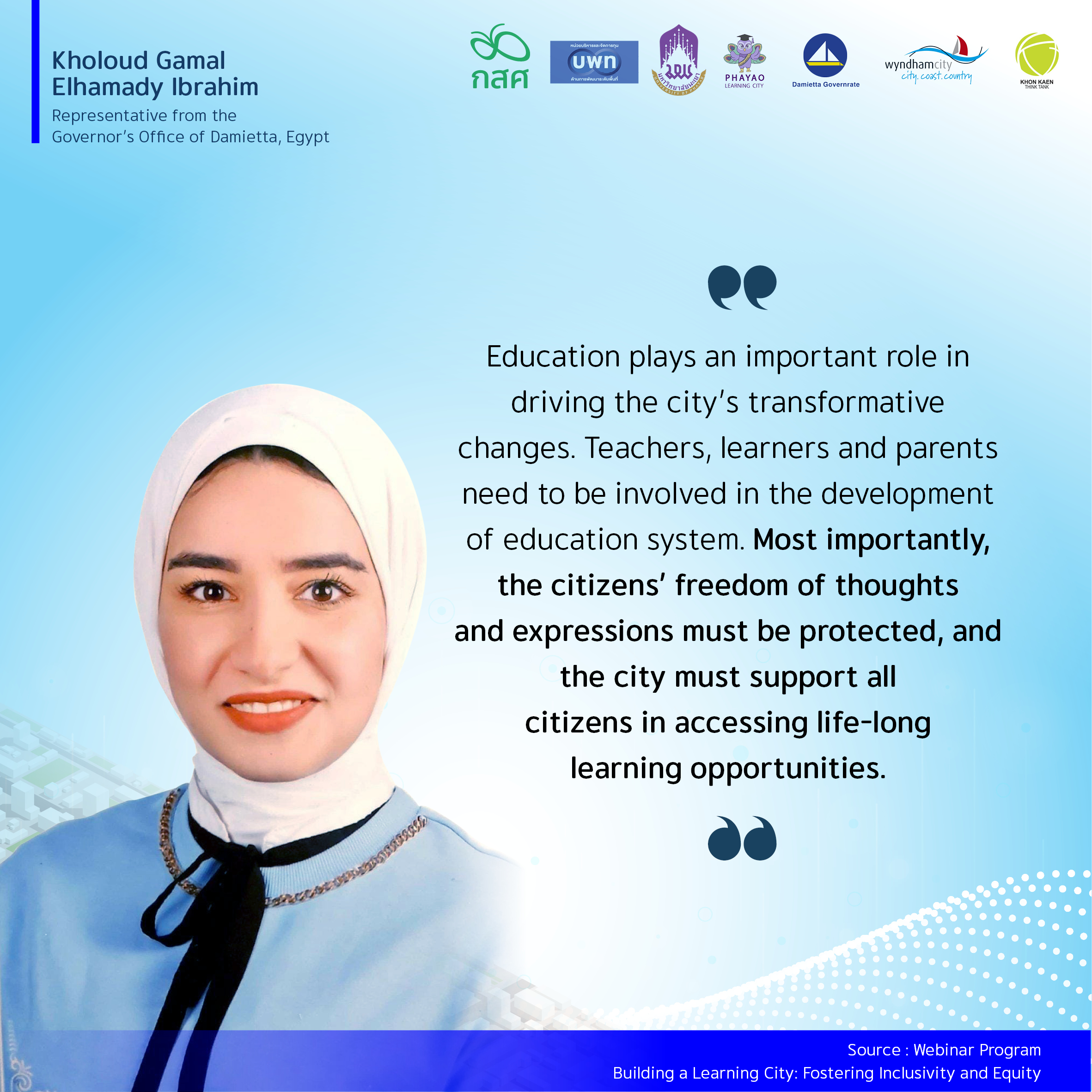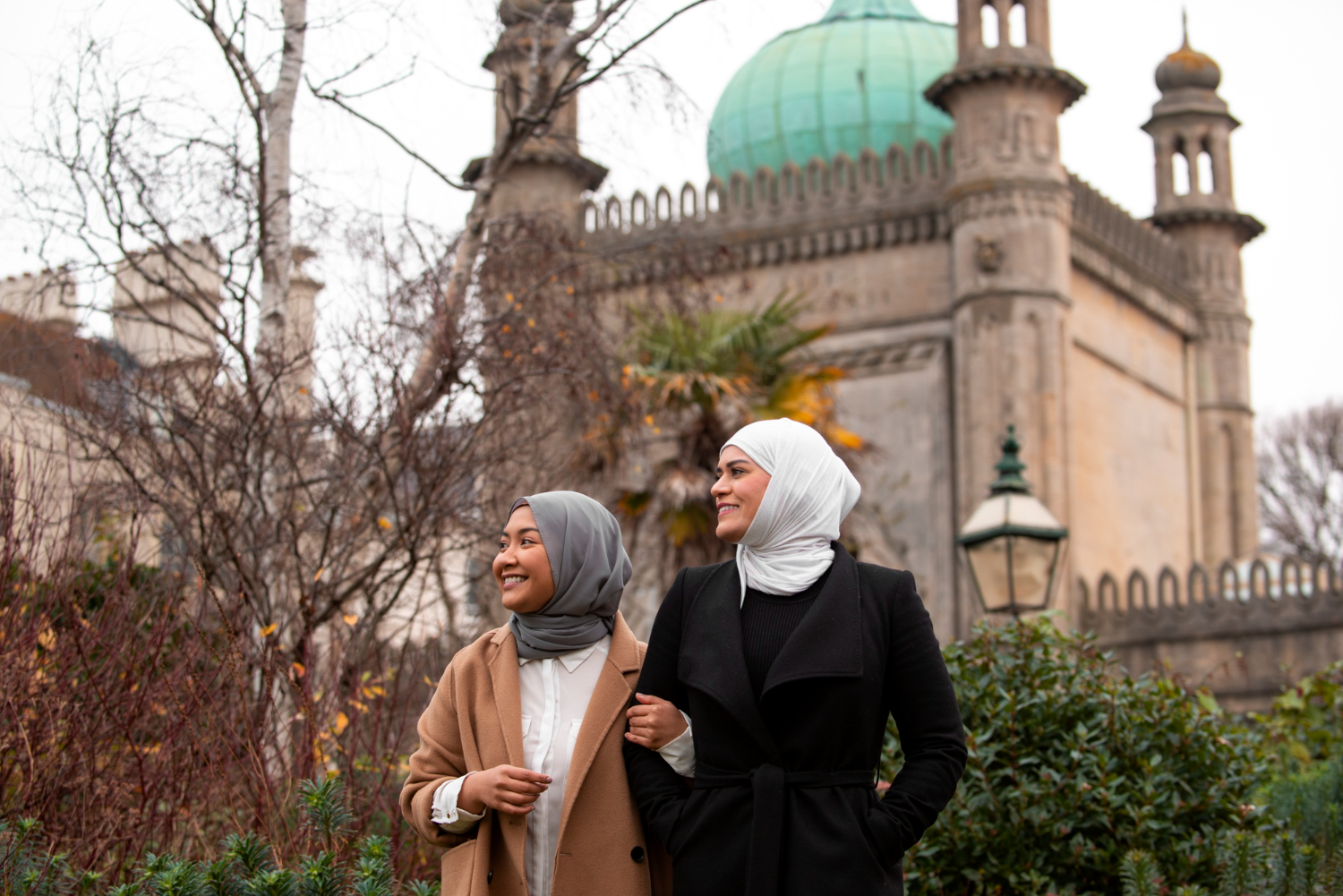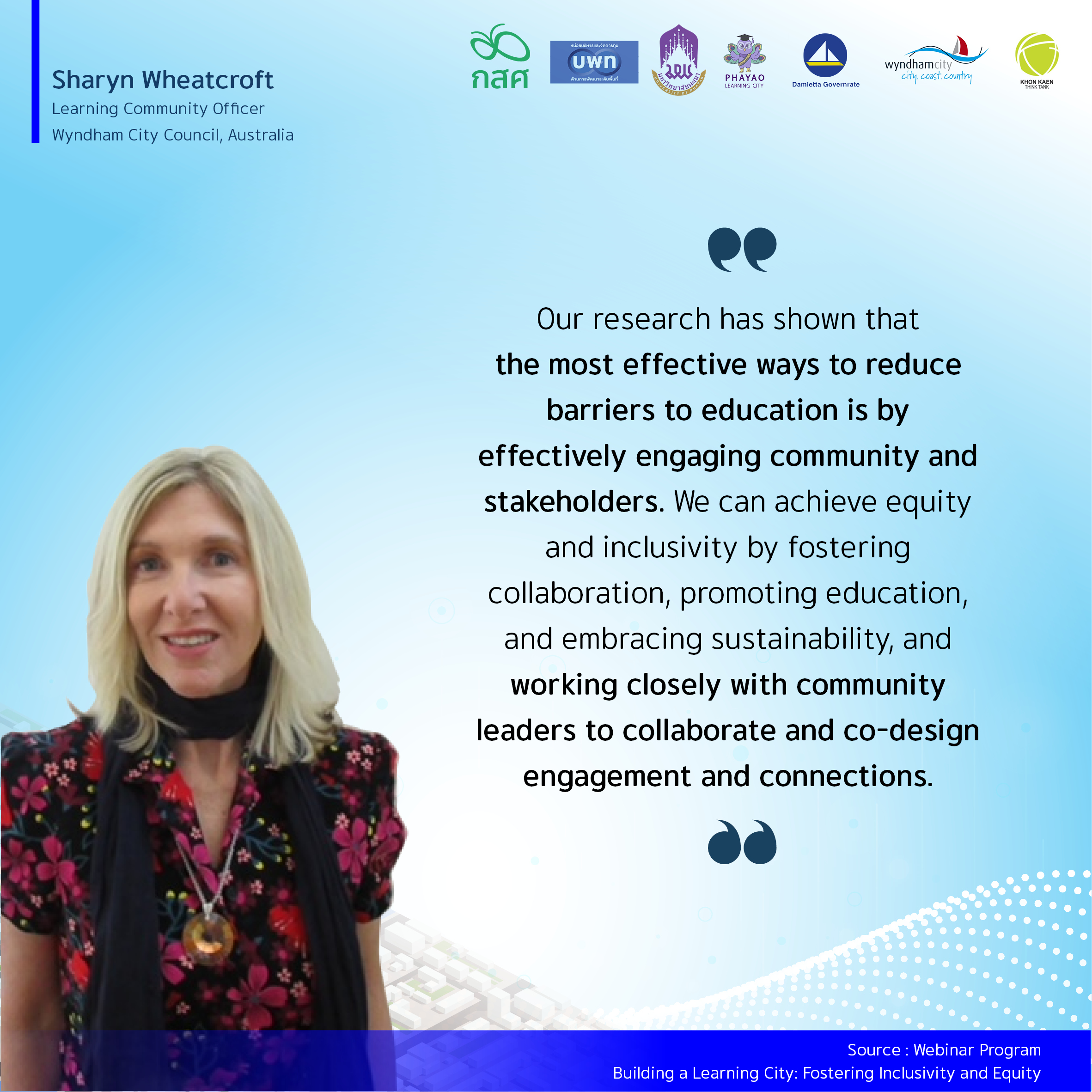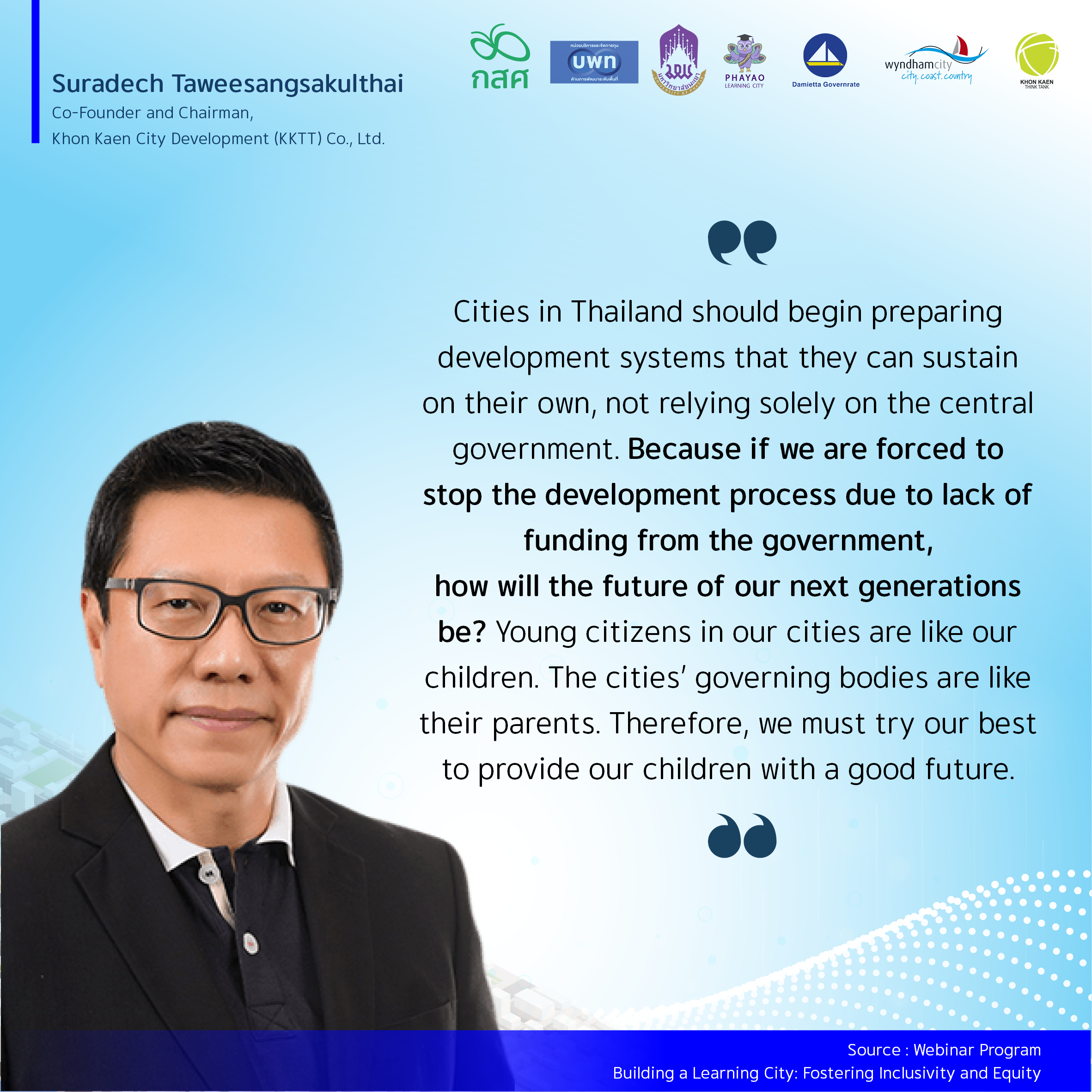
By Mrs. Kholoud Gamal Elhamady Ibrahim, Representative from the Governor’s Office of Damietta, Egypt
Ms. Sharyn Wheatcroft, Wyndham City Council Member, Wyndham, Australia, and
Mr. Suradech Taweesaengsakulthai, President and CEO of Cho Thawee Public Company Limited.
Co-Founder and Chairman of Khon Kaen City Development (KKTT) Co., Ltd.
————————————-
Cities play a pivotal role in ensuring universal access to lifelong learning, not only addressing educational disparities but also mitigating social, economic, and cultural inequalities. The UNESCO Institute for Lifelong Learning (UIL) established the UNESCO Global Network of Learning Cities (GNLC) during the 2013 International Conference of Learning Cities in Beijing, China. Through this global network, cities are urged to collaboratively develop various urban elements to foster equitable and sustainable lifelong learning opportunities for their residents.
This initiative resonates with United Nations Sustainable Development Goal (SDG) number 4, which calls for governments to guarantee inclusive and high-quality education for all, promoting lifelong learning. The concept of a learning city aligns seamlessly with the objectives of the Equitable Education Fund (EEF) Thailand, which seeks to diminish educational disparities and ensure equal educational access for all children.
While the EEF has historically focused on innovative tools to tackle specific educational challenges, it recognizes the limitations of this approach in comprehensively addressing inequality. Consequently, the EEF has shifted its focus towards spatial (area-based) tools, viewing the concept of a learning city as a pioneering innovation directly addressing spatial challenges and fulfilling its commitment to rectifying educational inequalities.
In addition to establishing a global network of learning cities, UNESCO also bestows Learning City Awards upon exemplary cities, showcasing excellence in urban development for lifelong learning. In 2021, the city of Damietta, Egypt, and the city of Wyndham, Australia, were honored with this prestigious award. Both cities offer valuable insights that Thailand can glean and apply within its local context.
Khon Kaen Province stands out as an exemplary case of a city that has achieved success in urban development, aligning with UNESCO’s Learning City concept within the Thai context. Its achievements serve as a testament to the possibilities and benefits of prioritizing lifelong learning in urban planning and development.

Case Study from Damietta, Egypt
By Mrs. Kholoud Gamal Elhamady Ibrahim, Representative from the Governor’s Office of Damietta, Egypt
Egypt, a nation grappling with longstanding issues of educational and social inequality, faced challenges in its educational landscape as of 2017. The World Economic Forum’s criteria rated the quality of basic and tertiary education in Egypt as low. Contributing to this was a historical lack of prioritization of education by successive governments.
One significant issue in Egypt has been the premature disengagement of children from the education system, primarily driven by poverty and child labor. However, recent years have seen an improvement in the dropout rates, attributed to the Egyptian government’s education reform plan outlined in the Egypt Vision 2030. In the 2019/2020 academic year, the attrition rate for students at the lower secondary level dropped to 0.2 percent, down from 0.3 percent the previous year. Similarly, at the high school level, it decreased to 2.7 percent from 3.7 percent.
Another pressing concern in Egypt is the escalation of violence against women. A 2021 UN Women Egypt survey revealed an 86 percent increase in violence against women compared to 2020. Additionally, a significant number of women in Damietta lack the necessary skills to sustain themselves financially. Damietta, situated on the northern coast of Egypt, heavily relies on fishing as a primary occupation. The nature of a fisherman’s job often requires the head of the family, usually a man, to travel far from home for extended periods, posing risks including the possibility of accidents at sea. Consequently, women in Damietta, primarily relegated to the role of housewives, face challenges such as insufficient income and a lack of skills for independent livelihoods.

“Safe City”: A Strategy for Eliminating Inequality
In 2017, the Egyptian government introduced the National Strategy for the Empowerment of Egyptian Women 2030, encouraging all sectors to prioritize women’s economic empowerment and the eradication of violence against women. This strategy aligns seamlessly with the conceptual framework of UN Women Egypt’s “Safe City Free of Violence Against Women and Girls “ project, which has been operational since 2011.
In June 2021, the Damietta Governor’s Office, in collaboration with the National Council for Women (NCW) and UN Women Egypt, established a women-friendly space in Damietta’s Ezbet El-Borg district. The objective is to ensure that everyone in the community has equal access, free from discrimination, violence, and sexual harassment against women.
This inclusive space hosts various activities, including meetings among female entrepreneurs in the community, displays of women’s products, and workshops providing craft and occupational skills training for women. Additionally, there are recreational and skill-building activities for local children, encompassing painting, drama, sewing, jewelry making, and more. The initiative aims to foster a supportive environment, empowering women economically and creating opportunities for skill development, while simultaneously providing a safe and nurturing space for children in the community.
Expanding Access to Learning Resources for All Citizens in Damietta
Beyond its commitment to fostering social equality, Damietta places a significant emphasis on promoting lifelong learning opportunities. This commitment is manifested through the establishment of various learning resources within the local area, ensuring easy access for all residents. These resources include museums, training centers, community classrooms, and a Technology Development Center.
The exemplar in providing knowledge to diverse segments of the population is the network of six libraries in the city, covering an entire area of just 910 square kilometers. These libraries actively organize workshops for both adults and children, spanning a spectrum of skills such as music, art, languages, and psychology. Notably, these activities are designed to be inclusive, accommodating library members with special needs and disabilities.
A particularly innovative initiative is the introduction of a mobile library service. With support from the Egyptian Ministry of Culture, the Damietta Governor’s Office has facilitated the deployment of mobile library buses to rural communities. These mobile libraries offer a rich collection of books in Arabic and other languages, English language resources, games, stationery, and dedicated reading and activity rooms equipped with air conditioning. Furthermore, they provide specialized support for disabled children, including specially designed chairs, and offer Wi-Fi internet access. This comprehensive approach ensures that learning opportunities are not only accessible but tailored to the diverse needs and abilities of all citizens in Damietta.

Case Study from Wyndham City, Australia
By Ms. Sharyn Wheatcroft, Wyndham City Council Member
Wyndham, situated in the southeastern state of Victoria, Australia, stands out as one of the country’s fastest-growing cities. With an impressive rate of approximately 110 babies born each week, Wyndham boasts a predominantly immigrant population, rendering it exceptionally culturally diverse. Notably, the city’s demographic is primarily youthful, with the largest population groups falling within the age brackets of 0-11 years and 25-59 years.
To bolster equal lifelong learning opportunities for its diverse populace, Wyndham has invested in an extensive educational infrastructure. The city hosts over 60 public and private schools, 5 libraries, and 17 community learning centers. This broad network is a testament to the city’s commitment to providing accessible and inclusive lifelong learning opportunities for all.
Since 2006, the Wyndham City Council has undertaken a collaborative effort with more than 50 partners to formulate and execute the Learning Community Strategy. This strategy, underpinned by a comprehensive set of guidelines, aims to furnish citizens with inclusive lifelong learning opportunities. Key practices within this strategy include Action 3: Strong Advocacy for Learning Access and Action 7: Inclusive and equitable learning for all citizens. These actions exemplify Wyndham’s dedication to actively advocating for learning accessibility and ensuring that learning opportunities are inclusive and equitable for every citizen.

Network Partners: Key to Success in Developing a Learning City
A pivotal factor in Wyndham’s achievements in creating an equitable learning city lies in its collaborative approach with various stakeholders and the local community. The Wyndham City Council has established several learning networks, fostering close coordination for the implementation of best practices.
In the pursuit of learning community strategies, the Wyndham Integrated Learning Group (WILG) is a notable collaborative initiative. This group focuses specifically on promoting learning opportunities for individuals with disabilities aged 15-30. Another significant network is the Wyndham Disability Services Network (WDSN), which facilitates professional skill enhancement for disabled individuals in Wyndham. It disseminates information about disability-related laws and connects disabled individuals with employment opportunities.
An annual highlight in Wyndham’s calendar is the Wyndham Education Roundtable, where stakeholders from diverse sectors convene to discuss current education challenges, brainstorm solutions, and collaboratively design new learning community strategies. Participants include leaders from academia, employment agencies, vocational training management departments, and representatives from various communities.
Additionally, Wyndham City Council organizes the Wyndham Learning Festival (WLF) annually to celebrate lifelong learning throughout the city. This festival invites interested parties to contribute to organizing learning activities and providing diverse learning experiences for Windham residents of all genders and ages throughout the week. By involving all sectors, particularly communities, in the policy-making process, the city administration gains awareness of real problems and needs, ensuring precise direction and effective implementation of policies. This inclusive and collaborative approach reflects Wyndham’s commitment to making learning accessible and relevant to its diverse population.
Library: A Vital Tool for Creating Lifelong Learning Opportunities
Similar to Damietta, Wyndham recognizes the library system as a crucial vehicle for delivering learning opportunities to the community. In the fiscal year 2022-2023, Wyndham hosted an impressive 4,266 library activities, drawing in 95,972 attendees across more than 27 libraries. Looking ahead to 2023, the Windham City Council is actively reimagining the library to enhance community access. The introduction of the Williams Landing Library Lounge represents a novel approach—a half-library, half-living room—providing a relaxed environment for community members to meet, unwind, and partake in various library activities.
Moreover, Wyndham has innovatively embraced mobile library services, introducing book lockers and more to further facilitate community access to learning resources. These initiatives underscore the commitment to making learning accessible and enjoyable for all.
The Wyndham Council has further tailored library activities to specific groups. Notably, the Sharing Stories Project, a collaboration with the Victorian Cooperative on Children’s Services for Ethnic Groups (VICSEG) and IPC Health, hosted a storytelling event for immigrant and vulnerable families. This project aimed to support families with children aged 0-5 years facing developmental challenges due to COVID-19. Additionally, in collaboration with the Library IT Unit and Wyndham Community & Education Centre, the council organizes Seniors Month activities every October, including a basic digital literacy training course for seniors. These initiatives showcase Wyndham’s dedication to ensuring that library activities are inclusive, community-focused, and responsive to the diverse needs of its residents.

Case Study from Khon Kaen Province, Thailand
By Suradech Taweesaengsakulthai, President and CEO of Cho Thawee Public Company Limited. Co-Founder and Chairman of Khon Kaen City Development (KKTT) Co., Ltd.
Thailand currently grapples with significant economic disparities among its population. A 2015 survey by the Office of the National Economic and Social Development Council revealed that 26 million Thai people earn an average monthly income of no more than 5,344 baht. In 2022, Thailand’s national budget amounted to 3.1 trillion baht, with approximately 46.5 million baht earmarked for investment across various provinces. Notably, a substantial portion of these funds is allocated to Bangkok province.
In response to this pervasive inequality, over 20 leading businesses in Khon Kaen Province have collaboratively established Khon Kaen City Development (KKTT) Co., Ltd. The acronym “KKTT” stands for “Khonkaen Think Tank,” symbolizing the company as the intellectual hub for the development of Khon Kaen Province, aiming to reduce dependence on the central government.
With a vision to create a sustainable tool for poverty alleviation in local communities, KKTT has devised an urban development prototype known as the “Khon Kaen Model.” This model is grounded in cooperation across five sectors:
- The political sector comprises various local political units, from municipal to provincial administrative organizations.
- The education sector encompasses local educational institutions, universities, schools, and various training centers.
- The economic sector comprises diverse groups of entrepreneurs, including local residents.
- Non-governmental organizations (NGOs) focused on public benefit, particularly those working in the environmental sector.
- The media plays a vital role in public relations and disseminating information about the project’s initiatives.

To secure funding, KKTT employs various avenues, such as submitting project proposals for central government budget approval, listing the company on the stock exchange, and engaging in international digital currency systems like Initial Coin Offering (ICO) and Security Token Offering (STO) in the United States. This multifaceted approach underscores KKTT’s commitment to addressing economic inequality and fostering comprehensive development in Khon Kaen Province.
The overarching goal of adopting the Khon Kaen Model is to advance towards a ‘Khon Kaen Smart City,’ characterized by intelligent and sustainable development. This holistic vision encompasses the progress in six key areas: 1) Smart Mobility, 2) Smart Living, 3) Smart Citizen, 4) Smart Economy, 5) Smart Environment, and 6) Smart Governance.
While this model emphasizes smart city development through the utilization of data and technology, its utmost priority is the development of its people. Every facet of development aims to empower citizens for sustainable livelihoods, stable incomes, and digital proficiency to effectively leverage modern technology.
Presently, KKTT has established a fund targeting low-income earners, considering this fund as one of its shareholders listed on the stock market. This innovative approach enables individuals with lower incomes to earn supplementary income through stock dividends. Additionally, ongoing projects leverage blockchain technology, including the KGO digital coin and the NFT digital token art trading system designed specifically for the local population, aiming to generate local income.
Khon Kaen has already achieved success in developing the city’s infrastructure to a considerable extent. The ongoing project in Khon Kaen is accelerating the establishment of a light rail system and land development centered on mass transit, embracing the concept of Transit-Oriented Development (TOD), among various other initiatives. The commitment to holistic development in Khon Kaen underscores the city’s dedication to creating a smarter, more sustainable future for its citizens.
Source:
Watch event: https://www.facebook.com/100064330196090/videos/1564174887457106

